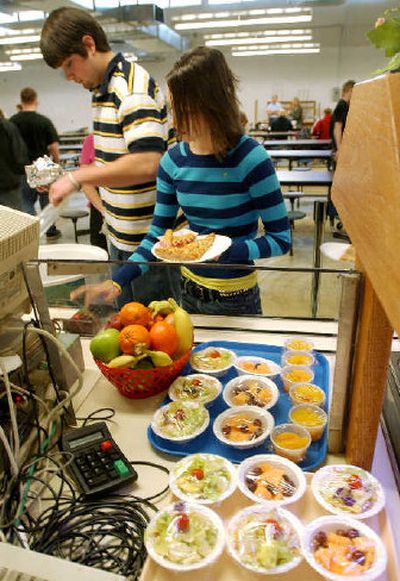Parents weigh in with concerns about nutrition of school lunches

Several members of The Spokesman-Review’s Parents’ Council began chewing on (pun intended) the topic of school lunches recently. Here’s an excerpt from their blog conversation. Read additional comments, and add your own at www.spokesmanreview.com/blogs/parents/
“This year begins our first public school hot lunch experience and I’m pondering what, if anything, I should do regarding what is offered, or more to the point, what is not offered. We’re not technically vegetarians but we don’t eat mammals or birds and we don’t drink cow’s milk. So after looking at the menu for September, and despite the district offering a choice of two main courses, there are only two days that offers a lunch with a main entree that he can eat. I thought about whom I might speak to at the school about getting them to offer a soy milk alternative and a non-meat entree every day, but then I thought some more and realized that there are many, many different lifestyle, cultural and religious diets out there, and is it reasonable to expect a school district to meet everyone’s needs and/or wants? Probably not. However does this mean that public schools don’t offer any alternatives to the meat and potatoes, processed and/or deep-fried meals? Should the district just not even bother to try to offer real alternatives to those who choose non-meat, low fat and fresh foods, since they won’t ever be able to offer every child something that their family wants them to eat? Nowadays is it reasonable to offer soy, almond, or rice milk, considering they offer both skim and 1 percent milk cow’s milk?” – Rachel Peters
“I agree … there is no way a school can accommodate everyone. Also, if you choose to tread off the beaten path (and I can say this honestly because I was born a nonconformist), then you are on your own to honor your decisions.
I think what is important about school lunches is not that they offer alternatives but rather that they simply continue to be offered. There are many families in our Spokane community who have little resources with which to feed their children, so these children are fortunate to receive two full meals a day when they otherwise might not (remember the article in the paper at the beginning of summer about the sack lunches and the huge turn-out?). …
I work 40-plus hours a week, and am a single mom, but I still cook a meal from scratch every night. I also send my son to school with a lunch everyday; I know he will eat it and I know he will get enough to eat. As an individual who still has the right to choose my lifestyle … , I think it’s unnecessary to try to make institutions bend to everyone’s individual desires when I can more easily just take care of me and my own.” – Reanna Thompson
“I understand the concern about school lunches. We have a similar concern. In our view, there are too many fried or breaded items, too much fat, too many sweets, too few vegetables, and too much reliance on potato. But I’ve never catered for 400 children – perhaps it can’t be done any differently.
Regardless of the “why” of the situation, we’ve chosen to feed our child from home. We had to rely on school lunches for a period of time last year, and our daughter began to gain weight. When we were able to cut back on school lunches, she dropped the weight she had gained. Now, we consider school lunches to be an occasional treat, just as we consider cookies or cakes or a fast-food meal.
However, there are children who would go hungry if not for these school lunches. The district does its best for those children with what it has, but it is limited by space, time, money, and so on. We can’t ask the district to be a restaurant, especially not a specialty restaurant.… If a plan to cater to individuals were ever forced on a district, I think it’s quite likely the whole meal program could be forced out of business.
It’s both reasonable and responsible for those of us with menu preferences to send our children with homemade lunches. That way, we can allow the district to do what it can for families that need or want that service.” – Laurie Rogers